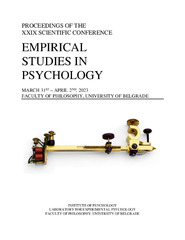Приказ основних података о документу
To prevent or to cure: How people use traditional, complementary and alternative medicine
| dc.creator | Purić, Danka | |
| dc.creator | Opačić, Goran | |
| dc.creator | Petrović, Marija | |
| dc.creator | Knežević, Goran | |
| dc.creator | Stanković, Sanda | |
| dc.creator | Lazić, Aleksandra | |
| dc.creator | Lukić, Petar | |
| dc.creator | Lazarević, Ljiljana B. | |
| dc.creator | Teovanović, Predrag | |
| dc.creator | Zupan, Zorana | |
| dc.creator | Ninković, Milica | |
| dc.creator | Branković, Marija | |
| dc.creator | Živanović, Marko | |
| dc.creator | Žeželj, Iris | |
| dc.date.accessioned | 2023-10-09T13:09:42Z | |
| dc.date.available | 2023-10-09T13:09:42Z | |
| dc.date.issued | 2023 | |
| dc.identifier.isbn | 978-86-6427-249-0 | |
| dc.identifier.uri | http://empirijskaistrazivanja.org/wp-content/uploads/2023/09/EIP23_proceedings.pdf | |
| dc.identifier.uri | http://reff.f.bg.ac.rs/handle/123456789/4927 | |
| dc.description.abstract | To understand the reasons behind the trend of growing use of traditional, complementary and alternative (TCAM) practices this study sought to uncover how people use them - to prevent disease/promote health, to treat medical conditions by complementing official medical treatments, or as an alternative to them. A sample of N = 583 Serbian citizens completed an online questionnaire assessing four TCAM domains: Alternative medical systems (AMS), Natural product-based practices (NP), New Age medicine (NA), and Rituals/Customs (RC). Participants indicated whether they had used a given practice in the past year, and if yes, how they used it. Overall, participants used TCAM preventively in two-thirds of cases, but we also found a significant association between TCAM domain and way of use. AMS was used alternatively more than any other TCAM domain, NP was the most prevalent complementary treatment, while NA and RC were predominantly used preventively. Our results suggest that different domains of TCAM practices may impact people’s health differently, depending on how they are used, which should inform interventions. | sr |
| dc.language.iso | en | sr |
| dc.publisher | Institut za psihologiju, Filozofski fakultet, Beograd | sr |
| dc.publisher | Laboratorija za eksperimentalnu psihologiju, Filozofski fakultet, Beograd | sr |
| dc.relation | REASON4HEALTH - Irrational mindset as a conceptual bridge from psychological dispositions to questionable health practices (RS-7739597) | sr |
| dc.rights | openAccess | sr |
| dc.rights.uri | https://creativecommons.org/licenses/by/4.0/ | |
| dc.source | Proceedings - XXIX scientific conference Empirical Studies in Psychology | sr |
| dc.subject | alternative medicine | sr |
| dc.subject | traditional medicine | sr |
| dc.subject | health behaviors | sr |
| dc.subject | preventive tcam use | sr |
| dc.subject | alternative tcam use | sr |
| dc.title | To prevent or to cure: How people use traditional, complementary and alternative medicine | sr |
| dc.type | conferenceObject | sr |
| dc.rights.license | BY | sr |
| dc.citation.epage | 25 | |
| dc.citation.spage | 22 | |
| dc.identifier.fulltext | http://reff.f.bg.ac.rs/bitstream/id/12060/bitstream_12060.pdf | |
| dc.identifier.rcub | https://hdl.handle.net/21.15107/rcub_reff_4927 | |
| dc.type.version | publishedVersion | sr |

